2016 New York City MarathonNov 6, 2016 by Joe Battaglia
Ghirmay Ghebreslassie, Abdi Abdirahman Have Timeless Runs At NYC Marathon
Ghirmay Ghebreslassie, Abdi Abdirahman Have Timeless Runs At NYC Marathon
Ghirmay Ghebreslassie of Eritrea broke the competition with a stunningly-effortless surge before the 20-mile mark to win the TCS New York City Marathon.
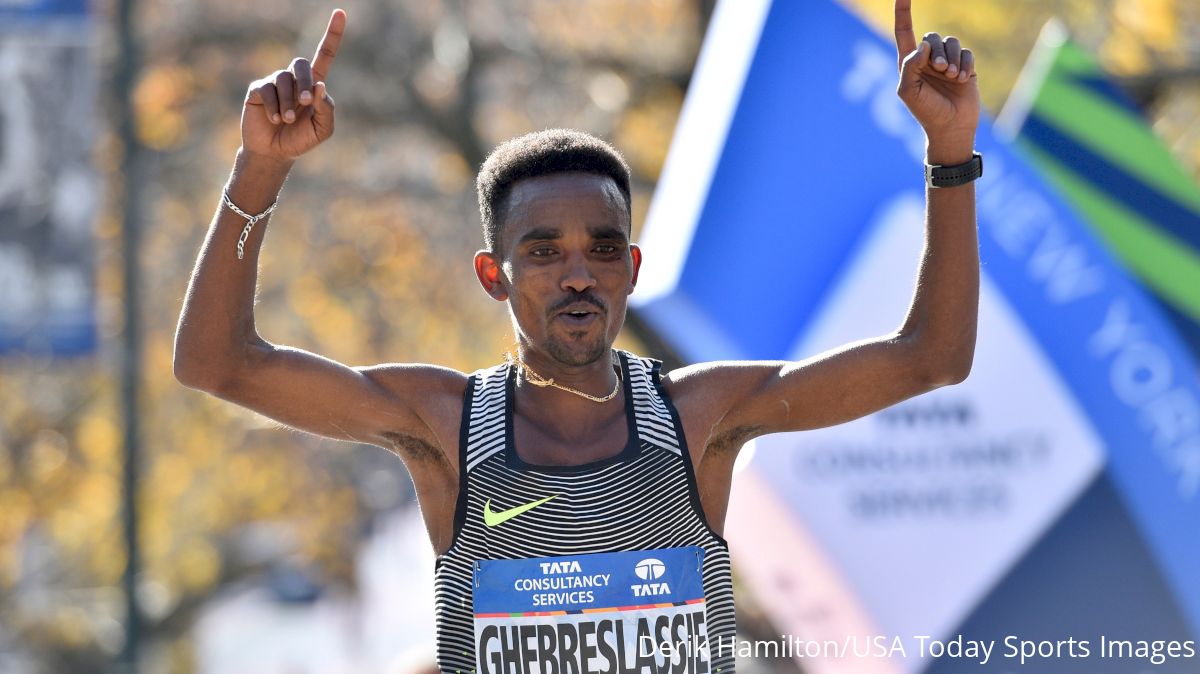
Ghirmay Ghebreslassie of Eritrea turned in yet another masterful performance in his nascent marathon career, breaking the competition with a stunningly-effortless surge before the 20-mile mark to win the men's race in two hours, seven minutes and 51 seconds, while 39-year-old American Abdi Abdirahman earned his first-ever podium finish at the TCS New York City Marathon on Sunday.
The 20-year-old winner of the 2015 World Championships became the first Eritrean and the youngest champion in the history of the event. Tom Fleming (1975) and Alberto Salazar (1980) had shared that distinction, having won titles as 22 year olds. Kenya's Lucas Rotich finished second in 2:08:53 while Abdirahman finished third in 2:11:23, becoming the oldest podium finisher in the history of the race.
Click here for complete results
"For me, I don't think like I'm the oldest," Abdirahman said. "Age is just a number to me, so, to be honest, I don't look at it like that. I'm 39 years old. Age is just a number to me, but at the same time, I believe you can do anything you put in your mind to it.I enjoyed it. It was a great race. I don't look at my age as a disadvantage or advantage. Actually, I kind of look at it as an advantage because I knew the course and I've run it and I've been around a long time. I was telling these guys I was in the Olympics in 2000, and they were looking at me like, 'Really?' And I said, 'Yes.'"
THE EARLY GOING
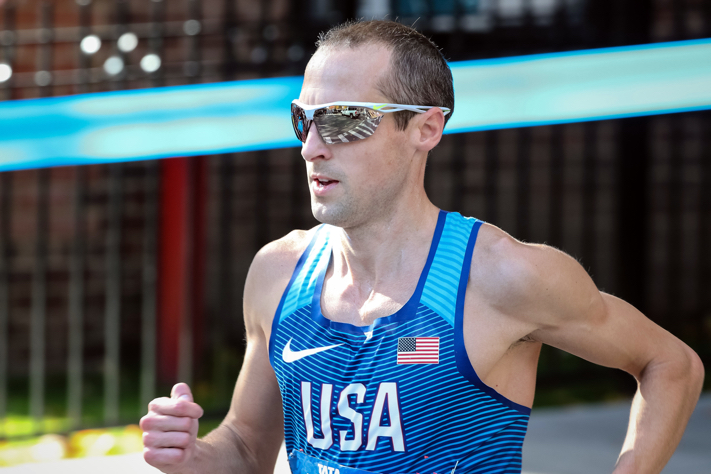
Dathan Ritzenhein was the early aggressor during the New York City Marathon. Photo by Vincent Carchietta/USA Today Sports Images
Dathan Ritzenhein, perhaps emboldened by an aggressive runner-up finish in 60:12 at the Great North Run on Sept. 11 in England and a strong training block, jumped to the lead from the start, leading the 20 elite runners across the two-mile expanse of the Verrazano Narrows Bridge in 9:48. He maintained that pole position, alongside Matt Llano as the leaders hung a left turn on 92nd street and then a right onto Fourth Avenue to enter Bay Ridge, Brooklyn.
The Americans were absorbed back into the lead pack at 5K, with the large bunch coming through in 15:17, but Ritzenhein quickly reestablished himself as the pace setter up front, hitting the five-mile mark in 24:42. Over the ensuing five kilometers, it became evident that Stanley Biwott of Kenya was not going to be a factor on this day. Biwott's hope was that a strong defense of his men's title would redeem himself in the eyes of critics and reaffirm his standing in the elite marathoning world after he was forced to drop out of the Rio Olympic race in August.
But by the time the elite leaders reached Third and Fourth Streets, where the Battle of Brooklyn was waged in 1776, Biwott was effectively disarmed by a most-moderate 4:56 pace, and fell back to 18th place, eight seconds off the lead. He worked his way back up to 12th place at the eight-mile mark, but labored to cling to the back of the pack. Biwott eventually dropped with a right calf issue as the runners rounded off Lafayette Avenue during the ninth mile.
"I feel very upset since I came to New York to defend my title," Biwott said. "I had a calf problem three weeks ago but I went through treatment and I felt ready to defend my title, but at 15K I had to realize that I could not make it to the finish line."
The pace picked up moderately to 4:50 during the downhill portion of the 10th mile along Bedford Avenue with Ritzenhein continuing to be the aggressor, coming through slightly ahead of the chase 11 in 49:10. Things slowed back to 5:00 pace through Williamsburg at Mile 11. Although Ritzenhein slipped into the middle of the lead pack, the collective group of faces remained unchanged as the runners made their way into Greenpoint and Mile 13.
DECISIVE MOMENTS
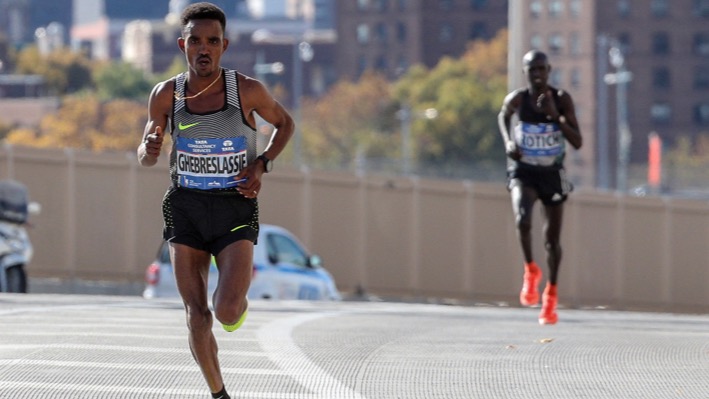
Ghirmay Ghebreslassie pulls away from Lucas Rotich on the Willis Ave. Bridge. Photo by Vincent Carchietta/USA Today Sports Images.
The first semblance of an aggressive move came at the 20K water station, when Rotich threw in a little surge to test the field. Ghebreslassie and Ethiopians Tadesse Vae Dabi and Lelisa Desisa covered the move quickly. By the time the leaders made their way onto the Pulaski Bridge connecting Brooklyn and Queens in 1:04:25 Rotich, Desisa and Ghebreslassie had broken up the field and assumed the lead.
The breakout three continued to click off at 4:55 tempo through Mile 14. Ritzenhein continued to lead a group of U.S. runners between fifth and 10th place that included Abdirahman, Shadrack Biwott, Tyler Pennel and Patrick Smyth, but at 19 seconds behind by this point it was clear that Meb Keflezighi's 2009 victory would remain the last by an American for another year.
Rotich and Ghebreslassie ran side-by-side with Desisa right behind and to the left across the Ed Koch Queensboro Bridge and onto First Avenue. No doubt emboldened by the "Wall of Sound" created by spectators that lined First Avenue six deep along both sides of the road, the leaders covered the 16th mile in blistering 4:26 pace. A 4:35 17th mile (1:22:23) inched those three closer to a projected 2:07-low finish.
That quick 16th mile appeared to start taking its toll on the Desisa at the 30-kilomter mark as his running form showed its first signs of deterioration and he began gritting his teeth just to stay with Rotich and Ghebreslassie. Desisa quickly dropped on the slight incline up to the Willis Avenue Bridge during Mile 19. Ghebreslassie continued to comfortably turn the screws up the bridge and, after a glance over his left shoulder, accelerated on the descent to break the chasers. By Mile 20, his lead over Rotich was 16 seconds and his cushion over Desisa was 43 seconds and swelling.
"We were helping each other before he dropped back," Ghebreslassie said. "Then after I look back once and he was a little bit far from me, and I was really a little bit angry with him because we were helping each other. I was thinking maybe others from behind can catch him. So I was a little bit competing with it. So I was okay."
Ghebreslassie is hammering it home here. We've just entered @CentralParkNYC and he's still looking great. #tcsnycmarathon pic.twitter.com/aaGA2uyNP7
— TCS NYC Marathon (@nycmarathon) November 6, 2016
Ghebreslassie admitted that he would have preferred having other runners around him later in the race to help with the pacing. His finishing time was 24 seconds off the Eritrean national record of 2:07:27 set by Yared Asmerom at the 2011 Chunchon Marathon in South Korea.
"I didn't (have) interest for everyone to win the race, what can happen," Ghebreslassie said. "Whether they beat me or not, it doesn't matter to me. In order to race them all, in order to race me, it's not good for us during the race. What I mean is I believe that to run only for time. If I run well with the time, I can be on position. That's why I prefer with the pacer. It's a little bit faster."
The recently married Ghebreslassie, who was racing his third marathon of the year, continued to click off sub-4:55 miles after bursting into the lead, making his way through the Bronx and back into Manhattan with the stress level of a Sunday long run. While clearly a force to be reckoned with on championship-style courses, it may only be a matter of time before we see him racing for time as well as titles.
"At the moment, yes, Ghirmay is better on the championship courses," said Jos Hermens, a former world record holder at 10,000m and Ghebreslassie's manager. "He is smart, he is very good tactically. He is good in the heat, as we saw in Beijing. Even today, he was one of the last runners to pull off his arm sleeves. At the same time, he does want to run a fast marathon. He just missed the Eritrean national record today, and that is one of his goals.
"I could see him running a fast marathon in the spring, but there are challenges. If the race is set up for a world record attempt, he might be able to run 2:04 but I am not sure he is ready for sub-2:03. We need to get him better coaching, better physic in Eritrea. The whole infrastructure needs to be built because it is not yet in place. We are really just scratching the surface of his potential."
Abdirahman, who made his first Olympic team when Ghebreslassie was only 5 years old, offered this bit of advice to the young champion:
"For a long career, just like don't try to make as much money as you can for one year," he said. "That's short and clear because like you can run three marathons and make a lot of money in one year, but your career will be over within three years. If you want to have a long career, longevity, enjoy life, do two or one marathon a year and just enjoy the moment and just make sure you're doing the right training. Stay with the same coach. Have the same routine."
BATTLE FOR TOP AMERICAN
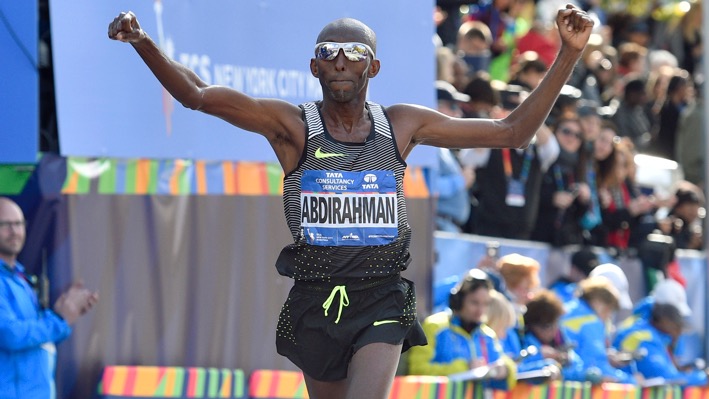
Abdi Abdirahman celebrates his third-place finish. Photo by Derik Hamilton/USA Today Sports Images
Further back in the race, Abdirahman and 31-year-old Shadrack Biwott were firmly entrenched as the leading Americans in fourth and fifth place, 2:49 behind Ghebreslassie. Ritzenhein, perhaps paying the price for his aggressive early tactics, was forced to drop out for the second straight marathon with a right heel issue. The 33-year-old had gone 12 years prior to 2016 U.S. Olympic Trials in February without a DNF.
"I came into the race with a bit of a heel problem," Ritzenhein said. "It was okay at first, but it started to really hurt and I couldn't keep going."
Meanwhile, Desisa was forced to drop at Mile 22, elevating Abdirahman into podium position as he continued along on a remarkable resurgent performance. Having been unable to complete a marathon in four years due to a series of untimely nagging injuries, dropped Shadrack Biwott along Fifth Avenue during the 23rd mile. By the Mile 25 marker, his cushion had swelled to 20 seconds.
On Thursday, Abdirahman said that his string of unfortunate injuries was brought on by pushing too aggressively in training in an attempt to make a fifth U.S. Olympic team and that recently he began listening more closely to his body and eased off when he needed to. The change of approach seemed to work. Adbirahman finished sixth at the Great North Run in 62:46, and by all accounts after that those who train with him in Arizona indicated that he was poised for a special performance here.
"My race plan today was to be competitive and stay at the top, make sure I'm always in the front group," Abdirahman said. "When (Ghebreslassie and Rotich) made the big move at the 20K, that move was just too fast for me. So I just ran my own race. I ran with other guys until we got to 36K. I didn't think I was going to finish third. I thought I might finish fifth, sixth, or seventh. When I passed Lelisa, that's when my eyes just -- I don't know what hit me, but I just get another wind. I said, 'I'm third place, and I'm going to go for it.' From there on, I started pushing the pace, and the last mile it was just homestretch for me."
NAIL-BITER IN WHEELCHAIR RACE
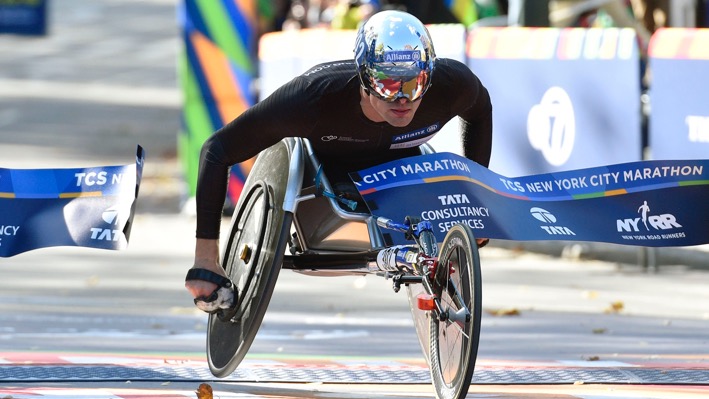
Marcel Hug crosses the finish line to win the men's wheelchair race. Photo by Derik Hamilton/USA Today Sports Images
Marcel Hug covered the first 10K in 20:51, opening a 1:13 lead on defending champion Ernst Van Dyk of South Africa and American Aaron Pike. By the eight-mile mark, Kurt Fearnley of Australia pulled even with Hug at 27:04. At 15K, Fearnley and Hug were dead even in 31:40 while Van Dyk slipped back to third, 1:44 behind. By Mile 14, Fearnley and Hug were again in a dead-heat with a two-minute lead on American Josh George 49 minutes into the race.
Hug and Fearnley were inseparable throughout the remainder of the race. In Central Park, Hug maintained an advantage on the uphill final 400 meters. Fearnley tried a late, slipstream move to the right but Hug powered through to win by approximately six inches in 1:35:49. The victory, his second in New York, capped a brilliant racing year for Hug, who won six marathons in 2016.
Had Fearnley followed the tangent and made that move to the left, which provided a shorter path to the finish, the outcome may have been reversed. Only six-hundredths of a second separated the two racers, the second straight year the men's wheelchair race ended in a photo finish. Van Dyk edged George for the win last November.
"It was a really tough race today," Hug said. "The uphills were really, really tough. Kurt Fearnley was very strong in the uphills, nearly killed me during the uphills. So it was tough. Also, the wind was really tough. But I tried to follow Kurt Fearnley on the uphills, and also I shared the lead with him because it was a big wind.
"I think we both thought that we'd make it in a finish sprint, as we did in the last few marathons. We had a lot of finish sprints, Kurt and I, so I was not surprised. But I was not sure to win in the sprint because I was really tired, and Kurt was really strong. I was only sure when I crossed the finish line."
Related Content
 Penn Relays 2024 Preview Hype
Penn Relays 2024 Preview HypeApr 22, 2024
 Here's Why You Don't Want To Miss The Bryan Clay Invitational
Here's Why You Don't Want To Miss The Bryan Clay InvitationalApr 22, 2024
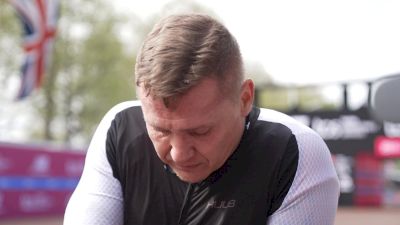 David Weir Takes Third At 2024 London Marathon
David Weir Takes Third At 2024 London MarathonApr 21, 2024
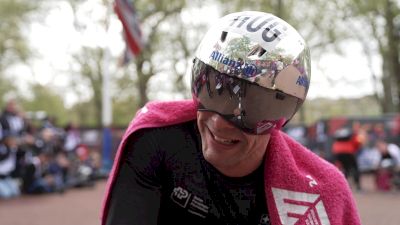 Marcel Hug Wins London Marathon A Week After Winning Boston Marathon
Marcel Hug Wins London Marathon A Week After Winning Boston MarathonApr 21, 2024
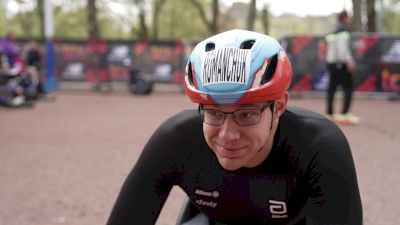 Daniel Romanchuk Second In Men's Wheelchair Race In London
Daniel Romanchuk Second In Men's Wheelchair Race In LondonApr 21, 2024
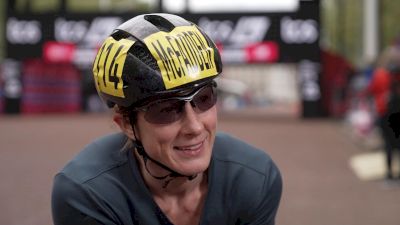 Tatyana McFadden Returns To London Marathon Elite Women's Wheelchair Podium
Tatyana McFadden Returns To London Marathon Elite Women's Wheelchair PodiumApr 21, 2024
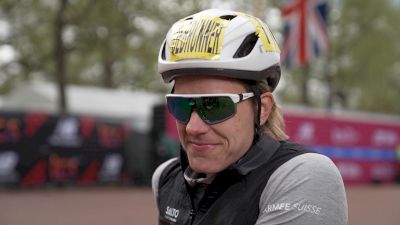 Catherine Debrunner Dominates Elite Women's Wheelchair Field In London
Catherine Debrunner Dominates Elite Women's Wheelchair Field In LondonApr 21, 2024
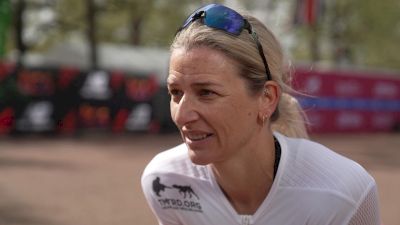 Manuela Schar Second In Women's Wheelchair Race In London
Manuela Schar Second In Women's Wheelchair Race In LondonApr 21, 2024
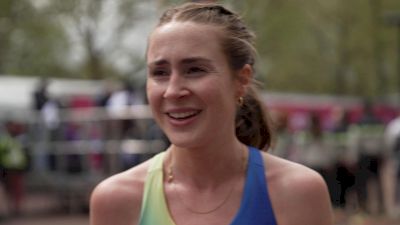 Mhairi Maclennan Finishes As Top Athlete From Great Britain At London Marathon
Mhairi Maclennan Finishes As Top Athlete From Great Britain At London MarathonApr 21, 2024